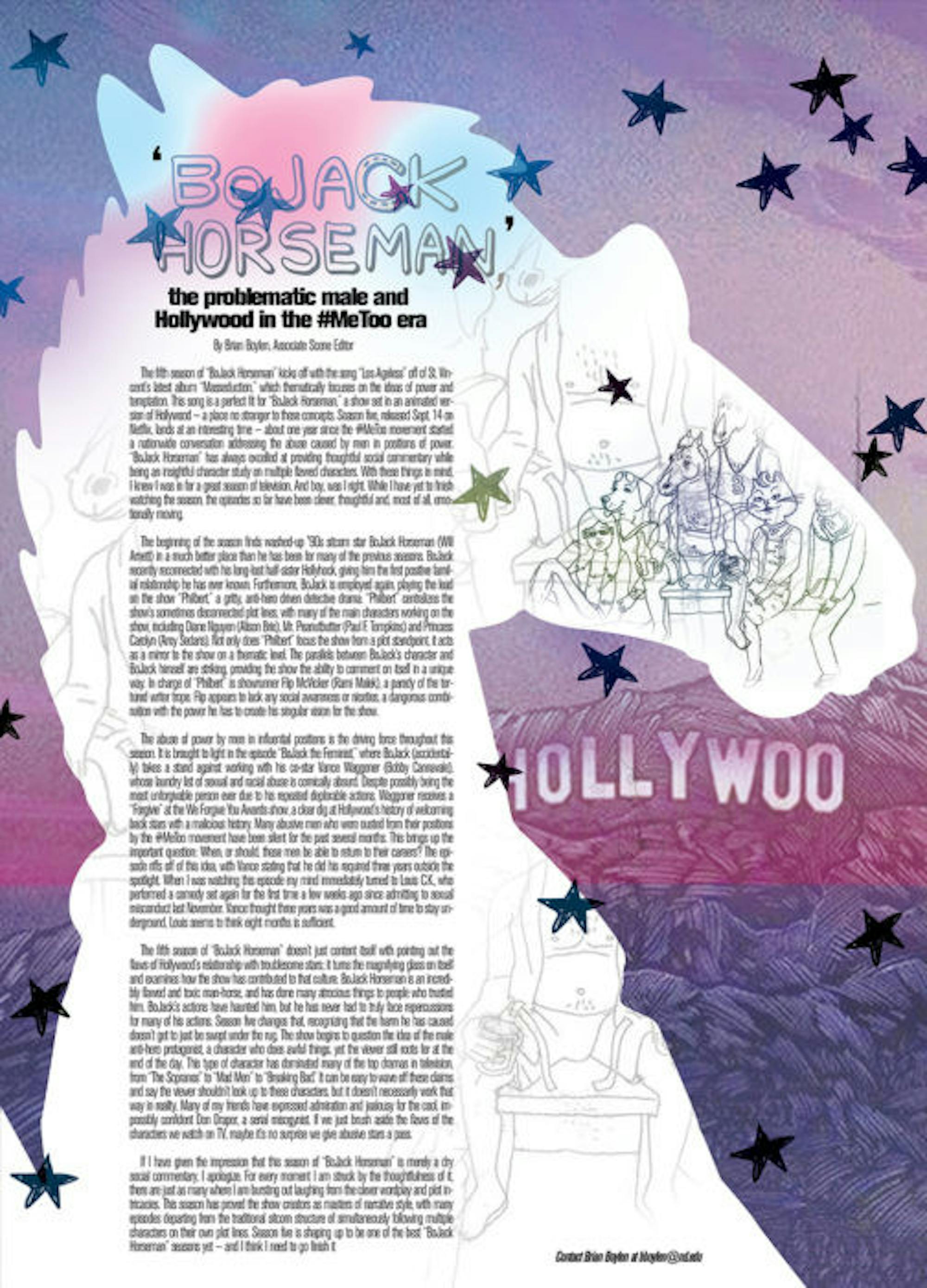
The fifth season of “BoJack Horseman” kicks off with the song “Los Ageless” off of St. Vincent’s latest album “Masseduction,” which thematically focuses on the ideas of power and temptation. This song is a perfect fit for “BoJack Horseman,” a show set in an animated version of Hollywood — a place no stranger to these concepts. Season five, released Sept. 14 on Netflix, lands at an interesting time — about one year since the #MeToo movement started a nationwide conversation addressing the abuse caused by men in positions of power. “BoJack Horseman” has always excelled at providing thoughtful social commentary while being an insightful character study on multiple flawed characters. With these things in mind, I knew I was in for a great season of television. And boy, was I right. While I have yet to finish watching the season, the episodes so far have been clever, thoughtful and, most of all, emotionally moving.
The beginning of the season finds washed-up '90s sitcom star BoJack Horseman (Will Arnett) in a much better place than he has been for many of the previous seasons. BoJack recently reconnected with his long-lost half-sister Hollyhock, giving him the first positive familial relationship he has ever known. Furthermore, BoJack is employed again, playing the lead on the show “Philbert,” a gritty, anti-hero driven detective drama. “Philbert” centralizes the show’s sometimes disconnected plot lines, with many of the main characters working on the show, including Diane Nguyen (Alison Brie), Mr. Peanutbutter (Paul F. Tompkins) and Princess Carolyn (Amy Sedaris). Not only does “Philbert” focus the show from a plot standpoint, it acts as a mirror to the show on a thematic level. The parallels between BoJack’s character and BoJack himself are striking, providing the show the ability to comment on itself in a unique way. In charge of “Philbert” is showrunner Flip McVicker (Rami Malek), a parody of the tortured writer trope. Flip appears to lack any social awareness or niceties, a dangerous combination with the power he has to create his singular vision for the show.
The abuse of power by men in influential positions is the driving force throughout this season. It is brought to light in the episode “BoJack the Feminist,” where BoJack (accidentally) takes a stand against working with his co-star Vance Waggoner (Bobby Cannavale), whose laundry list of sexual and racial abuse is comically absurd. Despite possibly being the most unforgivable person ever due to his repeated deplorable actions, Waggoner receives a “Forgivie” at the We Forgive You Awards show, a clear dig at Hollywood’s history of welcoming back stars with a malicious history. Many abusive men who were ousted from their positions by the #MeToo movement have been silent for the past several months. This brings up the important question: When, or should, these men be able to return to their careers? The episode riffs off of this idea, with Vance stating that he did his required three years outside the spotlight. When I was watching this episode my mind immediately turned to Louis C.K., who performed a comedy set again for the first time a few weeks ago since admitting to sexual misconduct last November. Vance thought three years was a good amount of time to stay underground, Louis seems to think eight months is sufficient.
The fifth season of “BoJack Horseman” doesn’t just content itself with pointing out the flaws of Hollywood’s relationship with troublesome stars; it turns the magnifying glass on itself and examines how the show has contributed to that culture. BoJack Horseman is an incredibly flawed and toxic man-horse, and has done many atrocious things to people who trusted him. BoJack’s actions have haunted him, but he has never had to truly face repercussions for many of his actions. Season five changes that, recognizing that the harm he has caused doesn’t get to just be swept under the rug. The show begins to question the idea of the male anti-hero protagonist, a character who does awful things, yet the viewer still roots for at the end of the day. This type of character has dominated many of the top dramas in television, from “The Sopranos” to “Mad Men” to “Breaking Bad.” It can be easy to wave off these claims and say the viewer shouldn’t look up to these characters, but it doesn’t necessarily work that way in reality. Many of my friends have expressed admiration and jealousy for the cool, impossibly confident Don Draper, a serial misogynist. If we just brush aside the flaws of the characters we watch on TV, maybe it’s no surprise we give abusive stars a pass.
If I have given the impression that this season of “BoJack Horseman” is merely a dry social commentary, I apologize. For every moment I am struck by the thoughtfulness of it, there are just as many where I am bursting out laughing from the clever wordplay and plot intricacies. This season has proved the show creators as masters of narrative style, with many episodes departing from the traditional sitcom structure of simultaneously following multiple characters on their own plot lines. Season five is shaping up to be one of the best “BoJack Horseman” seasons yet — and I think I need to go finish it right now.
Read More
Trending









